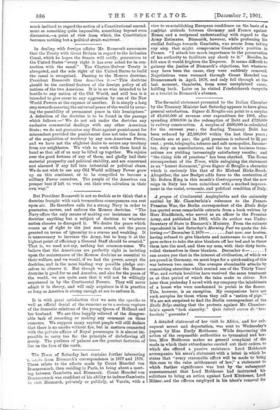In dealing with foreign • affairs Mr. Roosevelt announces that
the Treaty with Great Britain in regard to the Isthmian Canal, which he hopes the Senate will ratify, guarantees to the United Staten "every right it has ever asked formn con- nection with the canal." The Clayton,Bulwer Treaty is abrogated, and the sole right-of the United States-to build the ;anal is recognised. Passing to the Monroe doctrine; President Roosevelt thus describes it:—" This doctrine should be the cardinal feature of the foreign policy of all nations of the two Americas. It is in no wise .intended to be hostile to any nation of the Old World, and still less is it intended to give cover to any aggression by One of the New World Powers at the expense of another. It is simply a long step towards assuring the universal peace of the world by secur- ing the possibility of permanent peace in this hemisphere." A definition of the doctrine is to be found in the passage which follows:—" We do not ask under the doctrine any exclusive commercial dealings with any other American State; we do not guarantee any State against punishment for misconduct provided the punishment does not take the form of the acquisition of territory by any non-American Power, and we have not the slightest desire to secure any territory from our neighbahrs. We wish to work with them band in hand so that all of us may be lifted up together. We rejoice Over the good fortune of any of them, and gladly hail their material prosperity and political stability, and are concerned and alarmed if .any fall into industrial or political chaos. We do not wish to see any Old; World military Power grow up on this continent, or to be compelled to become a rain' tav Power ourselves. The people of the Americas can prosper best if left to work out their own Salvation in their own way."






























































 Previous page
Previous page